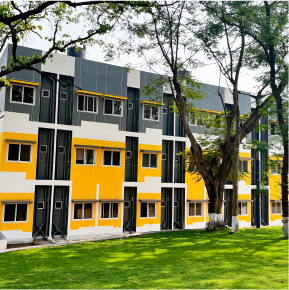Our Range of Prefabricated Construction Solution
Business and Government Solution
Individual Solution

Bachelor Accommodation
.jpg)
Industrial Facility
.jpg)
Modular Toilets
.jpg)
Smart Modular Toilet
.jpg)
Farmhouse
.jpg)
Modular Boardroom
.jpg)
Labour Shelters
.jpg)
Training Centre
.jpg)
EV Charging Station
.jpg)
Rooftop Extension
Business and Government Solutions

HabiNest is a unique Light Gauge Steel Frame (LGSF) hybrid solution that uses Light PEB and panelised construction. It is ideal for building industrial amenities, residential complexes, offices and commercial spaces, community centres, schools, hospitals, and more.

MobiNest is a range of portable & customisable steel cabins with high-quality insulation designed to be easy to install and relocate, meeting the fast-paced needs of the modern business and consumer world. MobiNest is most commonly used to create storage containers, site offices, cafes, mess rooms, kitchens, creches, homes for pets, retail kiosks, and yoga and recreational centres.

ChargeNest is a sustainable electric vehicle charging station that is uniquely designed to suit both commercial and personal purposes. It can be easily integrated with a charging station hub, energy storage units, and smart grid integration. Our charging infrastructure is the foundation for a more economical, environment-friendly, and effective electric vehicle ecosystem. The entire structure is made of steel and FRP material, and has a superior finish, appearance and appeal.

Smart EzyNest is a range of automated modular toilets designed to provide complete sanitation solution for the masses. Smart EzyNest saves costs in operation and maintenance through employing state-of-the-art service methods. The effectiveness of the solution can be attributed to its unique micro-controller based electronic circuitry, vandal proof design, luxurious interiors, and low operational costs.

EzyNest is a modern, durable and safe one-stop sanitation solution. EzyNest modular toilets are thermally insulated, generate minimal construction waste, and large parts of the unit are recyclable. The toilets are extremely easy and quick to construct and can be installed in the toughest of terrains and remotest of locations.






